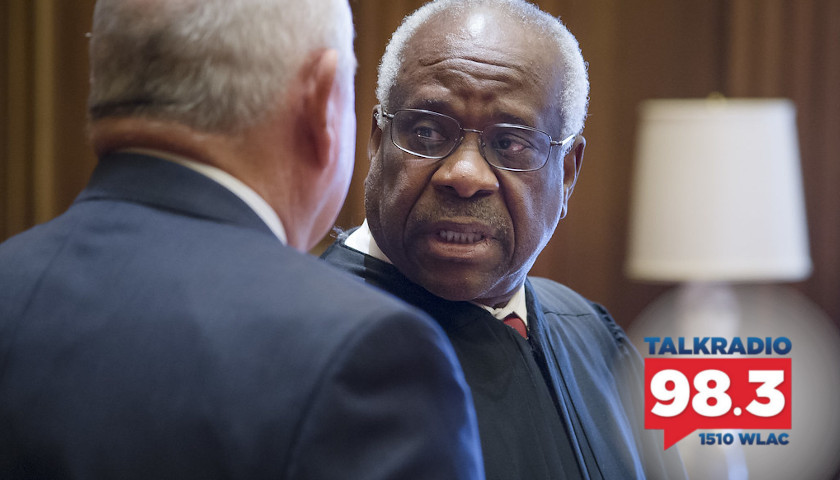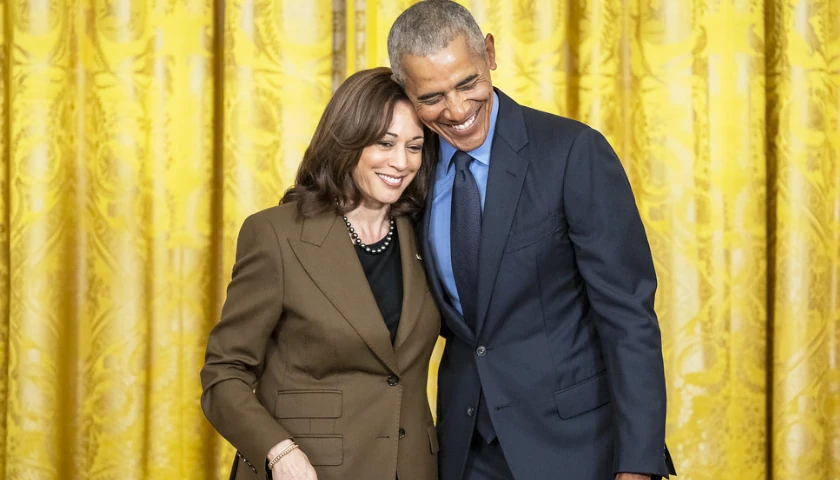Live from Music Row Thursday morning on The Tennessee Star Report with Michael Patrick Leahy – broadcast on Nashville’s Talk Radio 98.3 and 1510 WLAC weekdays from 5:00 a.m. to 8:00 a.m. – host Leahy welcomed co-author of Created Equal, Michael Pack, to discuss his new documentary and book about Clarence Thomas’s rise from poverty, radicalism, and ultimately becoming a Supreme Court justice.
Leahy: We want to welcome to our microphones right now Michael Pack. Michael Pack is going to join us and talk about a book about Clarence Thomas. Good morning, Michael. Thanks for joining us.
Pack: Thank you. Good to be on.
Simon: Hey, it’s Roger. We had dinner recently.
Pack: We did. Roger, I’m glad to see you, meet you, and talk to you again, on the radio.
Leahy: Michael, you are the co-author of a book about Clarence Thomas. Tell us about Clarence Thomas.
Pack: People think they know Clarence Thomas, but I think if they see the movie and read the book, they will know a lot more about Clarence Thomas. Both of them are based on a 25-hour interview I conducted with Justice Thomas several years ago, over a couple of months.
And we used a lot of that material in our two-hour film. And what we didn’t get into in the film, my co-author Mark Paoletta and I put into a book. And he has a great life story. You probably know this, Roger certainly knows this. He came from dire poverty in the circulated South, was raised by a grandfather who was functionally illiterate, really, but was a great man to him.
And from that background of dire poverty, he went to be a man of the Supreme Court. It’s a great American success story, an inspiring story with lots of twists and turns.
And it begins with being born in Pin Point, Georgia, in 1948, a Gullah area just outside of Savannah. So English wasn’t his first language. He was raised in a shack. His father left before, so he had no father, really, and his mother took her two boys from Pin Point to Savannah.
And as Justice Thomas said, he exchanged rural poverty for urban squalor. And there his mother worked as a maid, and he was hungry and cold in the winter, and she would bring him to school, and he would just leave school and wander the streets.
And after several years of that really grinding poverty, of a kind we seldom see in America anymore, his mother felt she couldn’t raise her two boys and brought them to her father, his grandfather, to raise.
And that changed his life, that turned his life around. His grandfather was this powerful, forceful figure. The first thing he said to the two boys was, the damn vacation is over. And we’re thinking what vacation? We just get here from dire poverty.
And he made them work hard, gave them discipline and hard-work values. Sent them to Catholic school. It was an all-black Catholic school – but run by Irish nuns, because it’s still the segregated south – run by these Irish nuns, and they, too, supported those values, hard work, discipline, and rigorous curriculum. Justice Thomas thrived, and so much so that he wanted to be a priest, something not a lot of people know about him.
He entered the seminary – and this is the late ’60s now, and this was an all-white seminary. He was one of the first black people to desegregate it. And there he started to experience racism and got caught up in the furor of the times, the politics of the times, and began to lose his vocation and made a shift to the Left.
And when he was watching TV with some white seminarians in 1968, the day Martin Luther King, Jr. was shot, one of the seminarians said, I hope that SOB dies.
Justice Thomas was appalled and shocked, as he should have been, and rejected the Church, rejected his grandfather, and became, as he said, an angry black man where race and racism explained everything. And he went through this radical period – another thing people don’t know about him – [he was] like Malcolm X and Rap Brown, and Angela Davis, and his grandfather kicked him out of his home. Didn’t like that he had lost his vocation. Didn’t like what he had become. Threw him out.
Justice Thomas was cast out and had to go wherever he could get a scholarship, Holy Cross, where he continued his radical career and invited Black Panthers to speak. And I think Roger and I, but especially Roger, had a period like that, can identify.
Simon: No kidding. (Laughter)
Pack: It was the late ’60s. And he, like Roger, was on the Left, and understands it, like Roger, from being inside.
Simon: The migration of Clarence Thomas is absolutely fascinating. And I say you did a great job in your film and I’m sure the book is also that way.
Pack: Thank you so much.
Simon: I’ve already read the excerpts of it and it’s terrific.
Pack: I do not feel I do justice telling this story. He tells the story in his words, direct to the camera. He’s a very good, moving storyteller.
Leahy: The book is Created Equal: Clarence Thomas in His Own Words. Let me ask you this. You’ve had an illustrious career as a documentary filmmaker. You were on Voice of America or, head of that agency, right?
Pack: The parent agency.
Listen to the interview:
– – –
Tune in weekdays from 5:00 – 8:00 a.m. to The Tennessee Star Report with Michael Patrick Leahy on Talk Radio 98.3 FM WLAC 1510. Listen online at iHeart Radio.





